The big box that I've been throwing stuff in since IGOTS 5 is full, so it
must be time to do IGOTS 6. . .
The Encyclopedia of Monsters by Jeff Rovin, Facts On File, New York,
1989, large 4to hardcover in d/w, 390pp including index, acid-free paper,
$29.95. This is a review copy of the latest companion volume to Rovin's
Encyclopedia of SuperHeroes and Encyclopedia of Super Villains.
The introduction pretty much ducks the issue of how a monster differs from a
villain, but entries from the previous volume are apparently not repeated,
though I haven't checked each one. Each entry is coded for the source - comics,
literature, movies, TV, etc. The volume is well-illustrated in b&w from the
sources, but the extensive color pages of the previous volumes in the series are
absent.
Our favorite bad novel, Werewolf vs The Vampire Woman by
Arthur N. Scram (or Scarm) is mentioned in the long entry under "El Hombre
Lobo", about the wolf man or werewolf (named Waldemar) played by Paul
Naschy in a series of seven Spanish films in the late 60s and early 70s. The
Scarm book is said to be a very loose novelization of the 1970 La Noche de
Walpurgis
This is a useful, well-made reference book. Address Books On
File, 460 Park Avenue South, New York, NY-10016
Ernest Mann at the Little Free Press, 2714 1st Avenue South, Minneapolis,
Minn-55408, one of the publishers who trades with us, sends a notice of his COA
and lists his available back issues. He says that his zines are still free, but
asks that readers pay the postage - 25 cents in the US. All of his publications
have to do with the idea that we would be better off with a `free' economy - by
which he means that all goods and services would be free and everyone would work
for no pay.
Rosemary's Tadpole, published by Janet Fox, 519 Ellinwood, Osage City,
Kansas-66523-1329, 1989, 8vo softcover, 36pp, $2. This is #4 in the series of
Killer Frog Contest Anthologies. I found out about it when Richard Dengrove
reprinted his 1st-prize entry The Carrot of Death in his zine for the
Southern Fandom Press Alliance. This story is so funny that I sent for the
anthology. Pretty good too, with some nice art that must be by Janet herself, as
it isn't creditted.
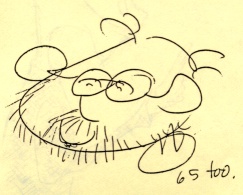
The Money Personality $ by A. E. van Vogt, Parker Publishing Co., West
Nyack, NY, 1972, small 4to, 201pp. The d/w and price are missing from this copy,
though it is in good condition otherwise. The back of the title page reveals
that the `A.E.' stands for `Alfred Elton'. I suppose this must be the sf writer,
and probably the best-known writer ever to have sunk to producing verbiage for
the infamous Parker line of exploitative self- help books. Any van Vogt
completist that wants the thing may contact me, I'm sure we can arrange a
mutually satisfactory deal.
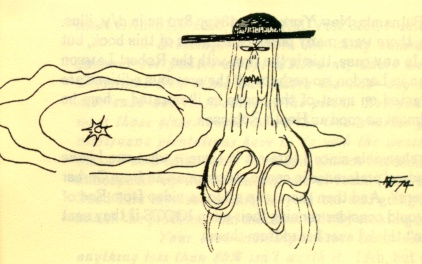 The Last Cat
The Last Cat
Book by Robert E. Howard, Dodd Mead, New York, 1984, 8vo pb, illustrated by
Peter Kuper, $5.95. I was somewhat startled to see this offered at $1.95 in
Edward Hamilton's remainder catalog. I didn't even know Howard had ever written
about cats. A previous appearance in Glenn Lord's Howard Collector
(Autumn'71) is noted, but the excellent Kuper illustrations are new here. The
writing reminds me a lot of Daniel Pinkwater's wonderful tales of his malemutes
and Maine coon cats. I got a few extra in case other Howard fans had missed
it.
Notebook for Betty-Sue Bach, P. D. Q. Bach, Theodore Presser Company,
Bryn Mawr, Pennsylvania, nd (1967 and 1973 copyrights noted), 28pp 4to pb,
$2.50. Edited, of course, by Prof. Peter Schickele, and decorated with very
silly pseudo-baroque borders. Includes eight pieces for piano (two hands). I
wonder what it sounds like?
Monsters & Madonnas by William Mortensen, Jacques de Langre,
Hollywood, 1967, 11x14 hc in d/w, $20. Not to be confused with the 1936 book of
the same title published by CameraCraft in San Francisco - this one has some of
the plates in full color. It seems to be sold exclusively (for $49 - the price
given above is what is on the d/w) by an odd outfit called The Grain & Salt
Society (Box DD, Magalia, Calif 95954) whose main business is to sell imported
French sea-salt and "Super blue-green algae" - they don't seem to offer any
grain - perhaps the name of the Society is really Grain of Salt - as in
"to be taken with a..."! But it's a handsome book anyway. Mortensen
specialized in what can only be called fantasy photography, producing with
makeup and staging and special effects pictures that have the impact of
something by Maxfield Parrish or N C Wyeth. I see that this book corresponds to
Part One of the older one, and they were hoping (twenty years ago!) to do Part
Two. But even though this book seems to dated 1967, it is in mint condition.
The Hobbit, A Musical Play, music by Allan Jay Friedman, lyrics by David
Rogers, book by Ruth Perry, Dramatic Publishing Company, Chicago, 1972, 124pp
small 8vo pb. An attractive booklet that Ken Ozanne spotted in a junk store
while visiting here and was kind enough to let me have for my Tolkien
collection. This is, according to the title page, an authorized adaptation. The
music, alas, is not included. The lyrics are dubious to say the least - the
forest scene with the trolls around the campfire has one of them singing "The
Troll King's Eatin' Song":
Sea food on Friday, some mermaid sauteed
Washed down with a glass of cold waternymphade
A wood elf named Galion has been added, and two spiders named Arachne and
Arachnius. Foo... The back cover seems to have been lifted from the original map
in the book and modified by the addition of what look like leprechauns.
MagiCon Original Bookmark Anthology, Joe Siclari (ed.), MagiCon, Orlando,
Florida, 1989, 8 2x8-inch cards, unbound. Most of the stories were written for
the anthology (including one by our Northern Ireland correspondent Walt Willis),
and most have original art by a well-known artist. A clever idea that will no
doubt be driving bibliographers and collectors mad for years to come.
The Treasure of the Isle of Mist by W. W. Tarn, Putnam's, New York, 1934,
184pp 8vo hc in d/w, illus. by Robert Lawson, $2. According to the d/w blurb,
there were many previous editions of this book, but they are not credited on the
back of the title page. In any case, this is the first with the Robert Lawson
art. Reginald notes a 1919 edition from Philip Allan in London, so perhaps all
the previous editions are British. I always felt that Lawson's talent was wasted
on most of the books he illustrated - here he shows what he can do with a real
fantasy, and it is almost as good as Heath Robinson.
Some of thus stuff in this box has become incomprehensible since I threw it
in there - what can I have meant to say about a local newspaper survey of
readers' preference in comic strips, or an ad from Gerber for very expensive
reproductions of old comics covers? And then there's an ad for a video from
End of the World Enterprises - I think I told them that I would consider
running their ad in IGOTS if they sent the video and I thought it was worth
getting, but I don't think I ever heard from them.
Letter from Kathleen Gallagher (Box 42, Worthington, Ohio-43085), who was
somewhat put out that I sent her something addressed to `Karen' Gallagher.
(Perhaps it's because this letter is signed just `KG'!) "Thanks for the recent
copy of IGOTS, how ever what does you gots? (It's late and I'm trying.)" (You
certainly are...)
"Quintessential Space Debris will be out later this
month or early February. The holidays are over and I'm out of excuses to not
fanac."
"My humble urges can't match the creativity of many of your loc
writers. I put my first creative urges into having a child. Now, I put them into
fanzines. It's not nearly as messy (You never saw Phil Harrell do mimeo!) or as
expensive as more children."
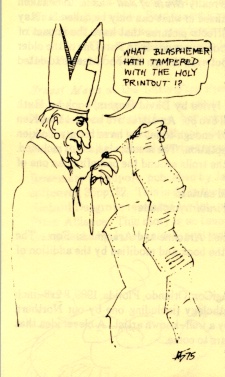
The C. S. Lewis Hoax by Kathryn Lindskoog, Multnomah, Portland Oregon,
1988, 175pp 8vo hc in d/w (but the price is omitted), illus. by Patrick Wynne.
The Multnomah Press, it say here, is "a ministry of the Multnomah School of the
Bible", and indeed the catalog they sent with this book was mostly inspirational
literature. I don't know the origin of the name `Multnomah' - it looks Latinish
at the front and Amerindish at the back. A nicely made book, and well written
too, all on the subject of just how Walter Hooper has carried out his
self-appointed stewardship of the literary estate of the late C. S. Lewis. Not
at all well, according to Ms Lindskoog, and she makes a good case, which I am
hardly qualified to judge, but have not seen any refutation of it either.
This is a complex book, but the most serious charges against Hooper seem to
be that he created the idea that he was a long-time friend of Lewis out of
`smoke and mirrors' in order to seize control of the literary estate; and then
mis-edited some of the papers - most notably in that he had published as Lewis'
work the fragment of a novel to have been called The Dark Tower. Ms
Lindskoog says he wrote this himself, and furthermore, lifted parts of it from
the well-known 1962 novel A Wrinkle in Time by Madeleine L'Engle, even
though it is presented as a fragment that Lewis abandoned in 1939.
The Patrick Wynne artwork consists of small chapter-headings, but it is quite
excellent. I also like the quotation from Logan Pearsall Smith given at the
beginning: It is almost always worthwhile to be cheated; people's little
frauds have an interest which more than repays what they cost us.
Marc Ortlieb (Box 215, Forest Hill, Vict. 3131, Australia) writes -
"Greetings etc from the chilly summer state of Victoria. It is a typically
antipodean summer everywhere except Melbourne, where we got just short of the
average December rainfall on Christmas Day alone and where the one-day cricket
match between Pakistan and Australia was shortened due to flooding of the pitch.
Everyone is screaming Greenhouse Effect but I don't know what those glass houses
where the local market gardeners grow rows of tomato plants to shield their
marijuana plantations have to do with the weather, unless it's the old Sodom
& Begorrah effect." (Is this a Pat & Mike joke? It seems almost
impossible to decrease amount of carbon dioxide put into the atmosphere by the
increasing use of fossil fuels by an increasing world population - the idea that
the Good Life involves getting in your car and going somewhere has been promoted
for too long. Can we attack the problem from the other side by creating more
shrubbery to take carbon dioxide out of the air?)
"Your book marking scheme looks very much like the one I use to grade my students - anything less than 80%
isn't worth it." (Ah, but some of the most interesting books were down in the
below-10% range! I have abandoned the attempt to assign any such crude linear
measure to books, and I would recommend doing the same with your students - even
the `worst' of them may be good for something (even if only to serve as a bad
example), and the `best' of them may well turn out to be (ptui!) politicians.)
"Waiting for a book to be remaindered doesn't seem to take long now-a-days,
especially here in Australia, where we often find British and U.S. remainders
dumped on the market before the book itself is released here officially. I just
wish they wouldn't punch the holes in the covers - I know that a goodly
percentage of remaindered books are only worthy of hanging up in the dunny, but
pre-punching the string hole is short of subtle."
"A letter from Walt Willis
and Vincent Clarke! It's almost enough to make me want to pub another ish
- but not quite, despite the delightful natterings. Letters like that help
justify the dead trees that fandom generates. I've often considered trying to
psychoanalyse fans, based on the way they organize their book collections. I
imagine Harry Warner Jr as having a copy of every book ever written, filed
carefully, with two pages reviews folded inside each back cover. Joseph Nicholas
and Judith Hanna's collection contains copies of ideologically sound s.f.
categorized according to political context, alongside the works of Marx, Trotski
et al... (The ideologically unsound material is used as a target for Joseph's
model helicopter gunships.) Bruce Gillespie's collection would be graded from
mildly depressing to blackly nihilistic..."
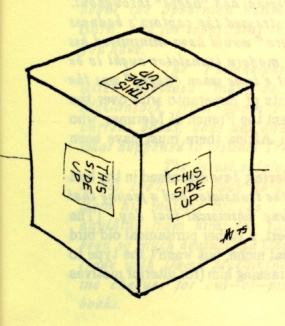
"Arthur Machen's essay was interesting, especially in the light of the reader response
critics of the late sixties and early seventies. I've been dipping into Stanley
Fish's Is There A Text In This Class? recently, having first encountered
it while doing a refresher course in English Literature in 1984. Fish was, in
his early work, fascinated by the idea that a text cannot exist in isolation
from the reader's interpretation of it. His article `What makes an
interpretation acceptable?' contains a quotation that should be imprinted on all
fanzines that enter into disputes."
"`...disagreements cannot be resolved by reference to the facts because the facts
emerge only in the context of some point of view.'
I'm not sure I understand that! Is he a damned relativist or
does he grant the existence of an objective fact (however complex)? To me, if
there ain't no elephant, or at least the hope of an elephant, the story of the
blind men and the elephant becomes extremely pointless and depressing."
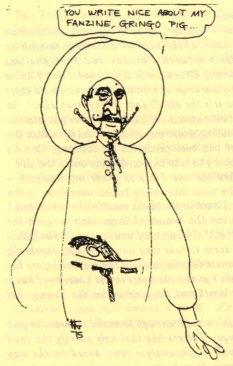
Among The Quiet Folks by John Moore, Lippincott, Philadelphia, 1967,
216pp 8vo hardcover in d/w, $4.50. I have mentioned the books of John Moore in
previous issues. A British collector told me that this one is quite rare because
it was issued first in the US. I found this one in a very small bookstore in
Norfolk that had just opened and the books were still being sorted. Fourteen
excellent stories, most on the edge of fantasy or the surreal, with settings
varying from 17th century England to the West Indies during WWII.
Ruth Berman (2809 Drew Avenue South, Minneapolis, Minn-55416) writes -
"You mentioned that you find it hard to resist a fantasy with a map - I
forget if you've discussed a couple of books by sort of Minnesota writers (the
qualifier is because one lives in Wisconsin, but she got her degree here),
Daughter of the Bear King by Eleanor Arnason, with maps by P.C.Hodgell,
and Godstalk and Dark of the Moon by P.C.Hodgell with her own
maps. All of their work is excellent. And the maps are a lot of fun. `Bear
King', besides the maps of the fantasy worlds involved, has a map of the parts
of Minneapolis and St.Paul that come into the story. (I have seen the Eleanor
Arnason name somewhere (F&SF?), but I am not familiar with these books.)
"And you were wondering how `nigger' is translated into French. French
doesn't have any way to distinguish between `nigger' and `negro', and translates
both as negre. One time I was reading a translation into English of some
stories by Prosper Merimee, and noticed that there were some places in one story
where the evil ship-captain referred to niggers (the narrative referred only to
negroes). A righteous, but not very sensitive, reader had crossed out all the
`niggers' and put in `negroes', apparently not realizing that the translator was
underscoring how Evil the captain was. I checked a copy of the French text, and
found as I expected that the original had negre throughout. An
interesting question is whether the translator really should have stressed the
captain's badness that way, or whether having the captain be polite enough to
say `negro' would have minimized his badness so much as to be false to the
original. (And whether a more modern translator ought to be using the term
`Blacks', although I think this translation came out at a time when `negro' was
the correct term.)" (Take that Gary Grady (a Slan I have argued the merits of
Esperanto with over the years)! Esperanto could no more translate "nigger" than
French - at least the French of Merimee, who wrote in the mid-1800s. Surely by
the time of the French colonies in Africa there must have been denigrating (!)
terms for the natives to justify their mistreatment...)
"I suspect that
"laissez moi en paix" {in Eugene Sue's Wandering Jew discussed in the
last issue} could have been translated into slang as "chain up your curb" if the
translator had a feeling that the character was a slangy type, or if the
translator was just feeling whimsical that day." (The character who says "chain
up your curb" is an old soldier named Dagobert, a rather puritanical old bird
who would probably use whatever expressions were common to his social niche, but
wasn't the type to invent colorful expressions. He says it to a villain of the
piece who is harassing him (for ulterior motives that are unknown to him and not
very clear to the reader either) in an inn.)
On The Side Of The Angels by Harold Begbie, Hodder & Stoughton,
London, 1925, 126pp small 8vo pb, 1 shilling. This is the fourth edition of Mr
Begbie's book, but there is no publishing history. Subtitled "The Story of the
Angels at Mons" and "An Answer to The Bowmen", with a rather nice cover
featuring two angels forming an arch of crossed swords, this book insists that
Arthur Machen's famous story, of WWI British troops being inspired at the Battle
of Mons by a vision of armed angels in the sky, is really true. Machen insisted
to the end of his life that he invented the tale.
The Bowmen was
first published on September 29, 1914, in a paper called The Evening
News. When it was reprinted in book form in 1915 in The Angels of
Mons, Machen declared that the story was pure invention. Begbie insists that
Machen is not only wrong, but is deliberately lying for some obscure reason,
that the story was inspired by a published newspaper account of the retreat of
the British Army from Mons. Alas, this news story is never quoted, nor the date
and place of its publication given. All of the eye-witnesses to the actual event
are only identified as "Corporal -----" and "Capt. -----", etc., except for a
Pvt. Cleaver. Machen himself looked into the testimony of Pvt. Cleaver and
discovered that Cleaver was not in the retreat from Mons, but in Westchester at
that time.
Begbie's principal complaint seems to be that Machen (who after
all wrote a great deal of fiction and non-fiction about faith and miracles and
presumably would have been happy to believe in a real miracle) insists on
denying the reality of the story of the Angels at Mons and thus removes some
essential spiritual support for British patriotism. His book is quite full of
jingoistic claptrap and totally gratuitous anti-Semitic rubbish in the most
tedious Victorian prose.
I don't remember where I got this book. It isn't in
spectacularly good condition - the top of the spine is gone - but I will put it
with the Machen books in a baggie as it is rather fragile.
Chester Cuthbert (1104 Mulvey Avenue, Winnipeg, Manitoba, Canada) writes -
"Many thanks for your letter of October 30th, the copy of Slanapa 225 for
October, and also for IGOTS #5 which has just arrived. Although I have read none
of the books you review, I am always happy to have your comments concerning
them." (I know what you mean - book reviews may reveal something you would like
to read, or on the other hand assure you that you needn't bother!) "We seldom
agree concerning our reading impressions, but we have common enthusiasms like
Merritt and Machen." (I am glad to remember having read Merritt, but I doubt I
will ever read much of his work again.)
"Thanks for your mentions of the New Orleans worldcon."
"Thanks also for the information about the Spearman
edition of Burn Witch Burn, and for identifying the Liveright editions
you have."
"The Philadelphia addresses your letter provided may be useful if
David McClintock, from whom I order most of my current books, does not already
have a line on what happened to Oswald Train's stock."
"The latest catalog I
had from Madle is his 1987. He may have dropped my name from his mailing list,
as I have never ordered anything from him; the rate of exchange has been so much
against the Canadian dollar, that I trade with David McClintock; in fact he
sends me cheques for out-of-print Arkham House books."
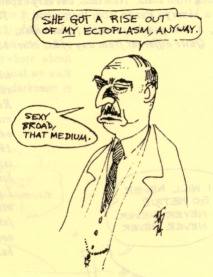
The Lemurian Stone by Stephen F. Hickman, Ace, New York, 1988, 342pp
small 8vo pb, $3.50. With a cover by the author, who is better known for his
artwork than his writing. As mentioned above, I am a sucker for a fantasy with a
map. And this one is not at all bad as sword and super-science thrillers go. I
carried it about with me and read it bit by bit while waiting for waiters and
bank tellers and so on. I mention it here mostly because of my annoyance at the
nomenclature. In spite of the title, there is no connection in the plot with the
original Lemuria of Sclater, invented as scientific speculation, nor even with
the silly books of Col. Churchward. Having given up any hope of an explanation
of the title, the reader is lulled by the generally rationally chosen names of
characters and places as the story progresses - and then, like a cockroach in
the soup, we come across "The Battle of Colophon". Now, the only common use of
the word `colophon' (from the Greek word meaning summit or crowning touch) is to
denote the section of a book or magazine that reveals when and where and by whom
it was published. There is also an archaic use of the word to mean pitch made
from the resin of the fir tree - this derives from the name of the town of
Colophon in Lydia, also a part of ancient Greece - Croesus was a king of Lydia.
But why afflict the reader with either of these references by using the name for
a battle that did not even take place on Earth, in fact in a universe that does
not even include Earth as we know it?
Ray Zorn (Box 173, Berne, Indiana - 46711) writes -
"Thank you for
IGOTS #5. It hardly seems a year since #4 came my way, but my card file says it
was by way of a Christmas greeting then."
"IGOTS #5 is interesting as usual.
I see my name en passant so I'll keep this (would anyway) as I have the four
previous issues. I am not expecting to be quoted! I think I said so before; you
were wise in mislaying my previous notes, and can do so with this." (Life is
full of little surprises...)
"Your review of a John Moore book sent me back
to IGOTS #3 and reminded me that I had told you then I had acquired for my
Linklater collection John Moore's England, the best of his country
writing chose and edited by Eric Linklater (Collins, 1970)." (I've never seen
this book, would like to have a copy!) "I haven't read it yet; I tell myself I
have a long life ahead because of `all these books' yet to read. Think I
probably also mentioned I obtained Michael Parnell's Eric Linklater, A
Critical Biography (John Murray, London, 1984), an impressively handsome
book with a good bibliography. (Still unread.) When Edrich bookseller of London
heard I had this they wanted to know where I got it!" (I get the Edrich lists -
did you recommend they send them? I am fairly sure I have never bought anything
from them. Nice lists, but very expensive and mostly out of my line of
interests. Hmm, perhaps I got a Mervyn Peake from them once...) "This year
Edrich did get for me Linklater's Karina With Love, a thin quarto
juvenile (Macmillan, London, 1958), photo illustrated, and a singularly illusive
book. Quite different from any of his other books."
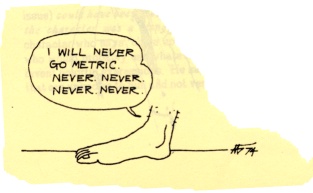
"I'm pretty
much out of touch with the antiquarian book world, but Richard Minter still
comes up with some surprises for my `personal bibliography' collection. Recently
he wrote me that he had unearthed two large mailing envelopes I had sent him
back in 1962, full of odds-and-ends of correspondence, etc from the late 1940's
when I published The Lovecraft Collector three issues, 1949. I had
remembered `dumping' this stuff on him, but had thought I had done it in the
early 1950's when I suddenly lost the interest in HPL. Minter still has the
original envelopes from me, with some letters, etc from fantasy `big names'
still remaining, though Richard had sold some items long ago. I don't want all
this `residue' back; I hope he finds a fantasy dealer who'll take it."
"But
he did find something in that batch I can't account for! Xerox or facsimile
copies of unknown origin of The Lovecraft Collector #1 and #3. These are
distinctly different from the Everts/Connors (1976) reprints, or the
Necronomicon (1977) reprint edition. Minter found these among the 1962
accumulation, but where they came from or how they got there is beyond my
memory! You can be sure these are now in my own collection, labeled as of
unknown origin! It is things like this that make me wonder what else is
`somewhere out there' from my past but unknown to me. Richard has turned up many
items for me; but there are still some I remember but that must be gone forever.
It keeps a spark of interest though!"
"I went to many garage sales this
summer, picking up books `just to read' or a few to keep. I've always passed
books on to Jon Mason's great old book store at Wabash, Ind., but when I was
there in June he had lock/stock/barrel up for sale ($137,500) and intended to
move to Pennsylvania in September. I haven't heard whether he actually sold, or
moved it all (what a job!) to Pennsylvania."
The Hidden Church of the Holy Graal by Arthur Edward Waite, Rebman Ltd,
London, 1909, xix/714pp 8vo hc. Not the original edition, however, but an
undated facsimile reprint (including an inscription by Waite) by the Yogi
Publication Society of Des Plaines, Illinois. I acquired this at SciCon this
very day - Bud Webster insisted that the Huckster Room at this convention
contained "no books" except for comics and Trekkie items, and in general I agree
with him, it was a poor excuse for a Huckster Room compared to the treasure
vaults of yore. Nevertheless, I managed to buy $51 worth of books in about 20
minutes... This was one of them, and cost $12. It appears to be in like-new
condition, no d/w but a gold-stamped imitation morocco binding.
A. E. Waite
was one of the closest friends of Arthur Machen (who was, of course, also
interested in the Grail Legend). One of the pieces in my 1987 Machen collection
Guinevere and Lancelot is an account of one of Machen and Waite's
bookhunting trips. Unfortunately, Waite did not share Machen's clear,
journalistic style of writing, but has an extremely verbose and turgid, almost
legalistic style in most of this book. And in spite of the endless qualifiers
and modifiers, he never thinks to explain anything for the benefit of those who
are not long-time scholars of the esoteric. Still, though I will probably never
read all of these 714 pages of rather small print, there are sparkles among the
coal:
"The old books help us, perhaps above all things, and among them the old
chronicles and the great antique legends. If the hand of God is in history, it
is also in folk-lore. We can scarcely fail of our term, since lights, both close
at hand and in the unlooked-for places, kindle everywhere about us. It is
difficult to say any longer that we walk in the shadow of death when the
darkness is sown with stars."
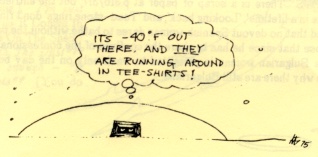
Roy Tackett (915 Green Valley Road NW, Albuquerque, NM-87107) writes -
"Considering that outside the sun is shining and the temperature is hovering
around 50F, it is difficult to believe that we are actually a week into December
but here is IGOTS 5 so it must be so. Thanx much for remembering me and sending
a copy along."
"Vin¢ mentions peanut butter sandwiches...in Old Blighty? It
was always my impression that peanut butter was something Americans invented and
the reaction of the rest of the world was, `you thought it up, you eat it.'"
(Sort of like the Aussie vegemite?) "Which, apparently, we do. By the ton, or
gallon, or however it comes. Particularly, it seems, our students who, in years
past, have been known to subsist solely on peanut butter for months at a time. I
think this has changed, though. The price on the jar of peanut butter I bought
last week was such that no starving student could afford it. And it wasn't even
gourmet peanut butter - just plain old peanut butter."
"Think about gourmet peanut butter..."
"Given the proper circumstances I see nothing to prevent a
peasant from becoming an intellectual. The proper circumstances would have to
include removing him from the peasant environment." (See Mike Resnick's ghastly
story For I Have Touched The Sky in the Dec'89 issue of F&SF.) "As to
vicing the versa...I'm reminded of the `hippies' of the late 60s. Bunches of
city kids formed communes to get back to the land and the simple way of life.
The natural way, as it were. They found out quickly that trying to raise their
food with only a shovel and a hoe was more work than they had counted on."
(Maybe they should have tried growing gourmet peanuts...) "Certainly, one (Not
this one!) can raise a small garden with a shovel and a hoe; I do it almost
every summer so we can enjoy the delights of a few fresh vegetables (which taste
so much better than the styrofoam imitations sold in the supermarket vegetable
departments) but I wouldn't think of attempting to raise enough food that way to
supply me for a year. That's real work."
"Space on the shelves is getting to
be a problem for all of us. I put up another 40 feet of shelves a few months ago
and it was almost enough. (Ah, for the wide open spaces of the West - I wish I
had somewhere to put another 40 feet of shelves!) "But that was only after I
culled a couple of boxes of paperbacks. But you know what will happen to those:
I'll end up trading at the used paperback shops and have almost as many as I
started with. And I'll be hard pressed to find room for more shelves or
bookcases." (I may yet have to implement my scheme for putting bookshelves on
the ceiling...)
"Good to see the note from Avram Davidson. I hope his health
continues to improve and he continues to write."
The Queer, The Quaint And The Quizzical - A Cabinet For The Curious by
Frank H. Stauffer, Davis McKay, Philadelphia, 1882, 367pp 8vo hc. They don't
make them like this anymore. Bound in dark green cloth, with the spine stamped
in gold and the front in red with a suitably wonky typeface. This copy belonged
to the Sondley Reference Library, apparently a function of the City of
Asheville, NC. I wonder if they were as tight with it as the local library is
with their copy of the Cumulative Book Index? There is a 13pp index too.
I can't remember now if I had any particular reason for setting this book
aside to me mentioned in IGOTS. There is a scrap of paper at p.316/317, but the
entries there on `Divining Rods', `Washing but once in a lifetime', `Looking
back', and `Toad-stone rings' don't ring a bell. Under the second heading it is
noted that no devout Spanish woman dares to bathe without the permission of her
confessor (one might suppose that since he has to share the confines of the
confessional with her he would hardly forbid it); while a Bulgarian woman is
permitted to wash only on the day before her wedding, which I suppose explains
why there are still Bulgarians...
Mark Valentine (109 Oak Tree Road, Bitterne Park, Southampton, SO2 4PJ,
England) writes -
"Thanks indeed for the copies of The Glitter of the
Brook {the collection of the five Arthur Machen essays from the Dalton,
Georgia Citizen and the first five issues of IGOTS}) "have passed one on
to Roger Dobson. We are both very pleased to have such a choice item. It must be
one of my rarest Machen items!"
"I am sending under separate cover, and by
surface, a copy of the reprint of the Machen biography - we have done a
paperback edition in collaboration with Aidan Reynolds, one of the authors."
(This book has never arrived, at least I can't find it. Not all that important,
as I have the 1963 Richards Press hardcover.)
"The Duckworth omnibus, The
Collected Arthur Machen, is out and has received mixed reviews. One, in
The Guardian, contains a phrase AM would have relished as the epitome of
patronizing faint praise - `Machen was a decent old cove who wrote good prose'.
Several commentators have objected to the title, pointing out that the book is
more a personal selection than a collection, and others regret the absence of
any of AM's supernatural horror."
"The Selected Letters of Arthur
Machen is also out, edited by Roger, Godfrey Brangham (of the Society) and
occult scholar R. A. Gilbert. There is to be a brief BBC (i.e. national) radio
feature on Machen this coming Wednesday, which I hope to tape, and could copy to
you."
"Please let me know if you need any help in acquiring the `Collected'
or the Letters book - though I think the Society will be stocking both." (I have
the dreadful feeling that I never answred this letter, probably waiting for the
pb mentioned above to appear. I do have the Duckworth omnibus, but if I ordered
the Letters have not recieved them. I don't think my last letter to the Society
was ever answered.)
"IGOTS 5 was as enjoyable as ever. The pocket booklet
you mention, published by J. L. Carr, does indeed emanate from England.
Kettering, the place of publication, is the second town of my home county,
Northamptonshire. The publisher is a quite well-known author, whose two best
known books are The Harpole Report and The Battle of Pollock's
Crossing. One or possible both of these were in the six titles nominated for
the prestigious Booker Prize for the best British or Commonwealth novel of the
year. Carr has published a whole array of these pocket booklets - selections
from the poets, notes on great eccentrics, sporting figures - I think he does it
as a hobby. I can send you a bundle if you like."
"All good wishes for '89."
Terry Jeeves (56 Red Scar Drive, Scarborough YO12 5RQ, England) (is this
the Red Scar Drive that crosses Wrinkle Avenue just above Acne Lane?) writes:
"Many thanks for the IGOTS which stormed the bastions of the Stately
Crumbling Jeeves Mansion this merry morn." {Or something like that, I'm
deciphering this handrot with my Captain Midnight Decoder Ring.} "I'm just
wondering what follows It Comes In The Mail and It Goes On The
Shelf? Possibly `It Gathereth The Dust'? Or, if we wait long enough - `It
Busteth The Brackets'?" (You do Carry On, Jeeves!)
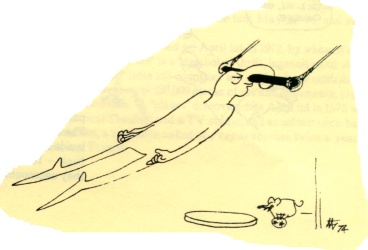
"An
unforgettable thing happened here yesterday, but as details escape me and I
can't recall what I was about, I'll go on to something different." (Completely
different?)
"Re saying nasty things and libel - I believe you can say (but
not write?) `I think Fred X is a burglar', but not `Fred X is a burglar'.
One being a statement of opinion, the other to be taken as a statement of fact.
I'm not sure where you are if you say `Many people think Fred X is a burglar' -
not that it matters as I have it on good authority that Fred X is a lunatic.
(Fred X - his father's name was `Ecks' but he prefers the simplified spelling -
is the only convicted ax murderer on my mailing list, and very sensitive about
his name.)
"Happy 65 by the way (Who, me? I am a mere tad of 51!) - I was 66
last month, so keep at it and you'll catch me up - unless I take a shortcut to
93 to avoid the Harry Warner syndrome. As for worries, I decided to collect all
my little worries into one big one and thus pay less worry payments each month
at a lower rate of worry interest."
"I see Vin¢ Clarke seeks a way to save
stamp-licking so herewith a valuable tip. Leave all your envelopes standing in a
bucket of water. Take them out as needed and they will automatically moisten the
stamp when it is put on." (Put on, indeed... The USPS has, in fact, just (11-89)
issued its first self-adhesive stamps - but they charge about 10% over face
value for them. With any luck, the public will have sense enough to ignore the
things and, having sunk a bundle in the hardware to make them, the PO will
eventually sell them at face value.)
"An alternative is to move to Sierra
Leone where they have self-adhesive stamps which you simply peel off the backing
sheet and bung on the envelope. Ain't science wonderful."
"Erg 105
just went off to the printers - I had to type it on a hand powered machine as
the w/p is in dry dock for major surgery. Next issue 106 will be
Erg's 30th Anniversary - how do you like that bit of trivia."
"Hoping this finds you as it leaves me."
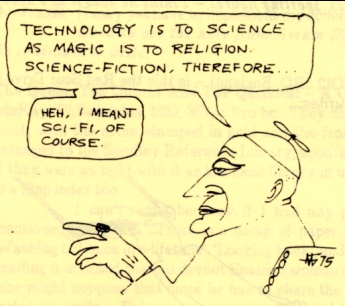
Fishwhistle by Daniel Pinkwater, Addison Wesley, New York, 1989,
xvii/232pp 8vo hc in d/w, $16.95. Actually, there are twelve cities listed below
the publisher's name on the title page - NY is one of them. Subtitled
"Commentaries, Uncommentaries & Vulgar Excesses", this is a collection of
the short funny bits such as he does on National Public Radio. I see that they
include the one where he accuses Leo Kratzner of stealing his Mad comic
collection - shortly after this ran on the radio, they broadcast a retraction,
seems Leo Kratzner was someone he knew as a child and Kratzner was listening and
called in to say it wasn't so! There's no retraction in the book, but of course
I have no tape of the radio piece, the actual name used may have been slightly
or entirely different.
A funny book. And being from a big textbook
publisher, the thing is actually bound in real cloth. The d/w photo of Pinkwater
with his ponies is stuck inside the back flap so that they can run blurbs on the
back - two of them by Ellison and Delany, though they unaccountably spell it
"Delaney".
The inimitable Harry Warner (423 Summit Avenue, Hagerstown, MD -
21740) writes -
"Hagerstown's public library discards books as inexplicably
(I think it has to do with the TV generation having taken over - the ones that
get to be librarians do know what a book is, but they don't know a good book
from a better one) as the Winnipeg library rejects Chester Cuthbert mentioned.
The local institution has plenty of empty shelf space so it can't be done for
crowding reasons. The withdrawals that puzzle me mostly are in two categories:
books that the library had kept for decades, are still in good condition, and by
their nature aren't outdated; if they are useless to the library now, why were
they kept that long? In this class are such things as a lot of volumes
containing musical compositions of the masters. The there are the discarded
books that are almost brand new and undamaged: why did the library buy them if
it didn't intend to keep them? An example is a biography of Eichendorff, the
German poet. Admittedly that's not the sort of book that will be in great demand
in Hagerstown, where the only persons who might concievable be interested are
voice students (many of his poems were set to music by Schubert, Brahms,
Schumann, and so on) and immigrants from German-speaking lands who are homesick
and want to read anything that will remind them of home. But here again, if the
library acquired a book with such limited interest, it might as well hand onto
it. These aren't stolen books, but books officially marked with the library's
big red WITHDRAWN rubber stamp and sold at the annual AAUW used book sale, part
of the proceeds of which go to the library. I can understand a library dumping
most copies of a best seller from a few years back which is no longer in great
demand, books on science that have been outdated by progress in science, and
such things."
"Anyone can make a typographical error in the text of a
newspaper or fanzine item, like those collected in the Denys Parson volumes. But
I've just acquired my first book that has a typographical error in its title.
The Metronome and It's Precursors is identified that way on the front
cover, on the spine, and on the title page inside. The publisher is Gresham
Books, Henley-on-Thames, Oxfordshire."
"You must have come into fandom just
too late to have Kettering in your memory as one of the most memorable cities in
the United Kingdom. It was the site of a series of British conventions during,
if I remember correctly, the late 1950s and early 1960s, just when UK fans were
at their best as entertaining scribes of their cons. The celebrated March of
Slime was first heard at one of the Kettering cons." (Yes, I wasn't in fandom
until 1962, never heard of the March of Slime - and I can't find it in any of my
filk books either, must not have made it across the ocean. Do you have the
words? I could run them in the next issue.)
House of Humour and Satire (5300 Gabrovo, P.O.Box 104, Bulgaria) sends -
in response to my rather bemused query after seeing their ad in some magazine -
some entry forms to their 1989 "Ninth International Biennial of Humour and
Satire in the Arts" which took place last May 20-24, and some general
information.
According to the literature, the House was established on April
1st in 1972, by whom it does not say. Gabrovo was chosen as the site because
"Gabrovian" is a "symbol of thrift, ingenuity and wit" in Bulgarian folklore.
Some 15,000 "authors and institutes" from 153 countries are said to have
contributed to the effort. There are ten exhibition halls and a collection of
138,000 pieces of art and documents, plus a reference library with 25,000
volumes and 7000 periodicals. A "planet" discovered on April 1st in 1976 was
named Gabrovo. There is an "Experimental Satirical Theater" and a TV studio, and
an information bank supported by UNESCO. Perhaps of most interest, a magazine
called A Propos appears twice a year in four languages - Bulgarian,
Russian, English, and French.
And all this long before glasnost! They
seem to want humour that is independent of language, which would eliminate puns.
Except for international news, it would seem that topical humour (they stick to
the British spelling) would also be out. One of their prizes is a figurine of
Charlie Chaplin, whose style of humour is often mentioned as being totally
visual and thus independent of a specific language.
No mention is made of
how to obtain this magazine. In fact, the only mention of money is the amount of
the various prizes, given in hundreds of levs - I'm not sure if this is
the Bulgarian currency unit or a pseudo-currency based on the Latin root for
humour, as in `levity'. No, I see from an old Scott stamp catalog that the Lev
(=100 Stotinki) is the primary currency unit.
Richard Dalby (4 Westbourne Park, Scarborough, North Yorkshire YO12 4AT,
England) writes -
"Many thanks for your letter of 20 November, and IGOTS Number 5."
"I've just found two more John Moore titles which have been
despatched to you today. Hope you'll enjoy them - they are two of his best
novels, Brensham Village (1946) and September Moon (1957). These
are both very nice first editions, with dust-jackets. Fortunately it is still
possible to find the post-1945 titles at reasonable prices. (Most of the pre-war
books are much more difficult to find.)" (Much thanks for these! I got last time
I was in Atlanta a 1966 US pb of September Moon, packaged as a "big
romantic novel of lusty, vital young men and women". Just sent you
(mid-November) those last two issues of Night Cry you wanted.)
Rants and Incendiary Tracts edited by Bob Black and Adam Parfrey, Amok
Press (New York) and Loompanics Unlimited (Port Townsend, Wash.), 1989, 219pp
8vo pb, $9.95. Subtitled "Voices of Desperate Illumination 1558 to Present",
this is a collection of very loud bits of persuasion or vituperation by very
opinionated writers. Most are, in some sense, political and/or religious; many I
find very nearly incomprehensible. Many famous ranters are represented: John
Knox, Jean Paul Marat, the Marquis de Sade, Judge Roy Bean, Ezra Pound, Wilhelm
Reich, Ayatollah Khomeini (in 1963!), Timothy Leary, and Szandor La Vey. Many
other I never heard of. All felt they had something to say, and they said it
very forcefully, often at the foot of the gallows. There are at least four
spectacular examples of this extreme form of rhetoric that aren't in the book -
I will supply the lack right here.
From Hunter Thompson's Generation of
Swine (Vintage Books, NY, 1989), about George Bush:
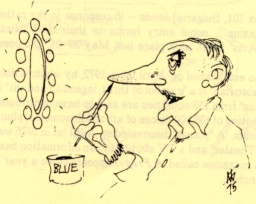
It is
difficult for the ordinary voter to come to grips with the notion that a truly
evil man, a truthless monster with the brains of a king rat and the soul
of a cockroach, is about to be sworn in as president of the United States for
the next four years.... And he will bring his gang in with him, a mean
network of lawyers and salesmen and pimps who will loot the national treasury,
warp the laws, mock the rules and stay awake 22 hours a day looking for at least
one reason to declare war, officially, on some hapless tribe in the Sahara or
heathen fanatic like the Ayatollah Khomeini.
From The Collected Works
of Aleister Crowley (Soc. for the Propagation of Religious Truth, London,
1905), a sonnet in praise of an unnamed publisher:
Egg of the Slime! Thy loose abortive lips
Mouth hateful things: thy shifty bloodshot eyes
Lurk craftily to snare some carrion prize,
The dainty morsel whence the poison drips
Unmarked: the maskéd infamy that slips
Into an innocent maw: corrupter wise!
Sly worm of hell! that close and cunning lies
With sucking tentacles for finger tips.
Earth spits on thee, contagious Caliban!
Hell spits on thee, her sin is spiritual.
Only the awful slime and excrement
That sin sheds off will own thee for a man.
Only the worms in dead men's bowels that crawl
To lick a leathlier brother are content.
There are two of these sonnets, and the other is just as bad...
From Michel Tournier's The Ogre (Doubleday, New York, 1972,
translated by Barbara Bray):
...political power belongs entirely to
Mammon. Those who exercise it take upon themselves all the iniquity of the
social body, all the crimes that are committed every day in its name. That is
why the most criminal man in any country is the one who occupies the highest
position in the political hierarchy - i.e., the President of the Republic and,
after him, the ministers, and after them all the dignitaries of the social body:
magistrates, generals, prelates - all servants of Mammon, all living symbols of
the murky mess called the established order, all covered with blood from head to
foot.
The organs of this body are perfectly adapted to its frightful
functions. To practice the most abject of trades, men are sifted out by a
topsy-turvy selection into groups constituting the most quintessential sublimate
of filth the country can offer. It is well know that a cabinet meeting, a church
conclave or an international conference gives off a smell of carrion that
frightens away even the most blase vultures. On a more modest plane, a board
meeting, a staff meeting, any gathering of a constituted body, is a thugs'
get-together that any averagely decent man would steer well clear of.
As
soon as a man lays down the law he places himself outside it, and thereby
outside its protection. Thus the life of a man exercising any kind of power is
of less value than that of a cockroach or a louse. Parliamentary immunity ought
to be transformed by benign inversion to give every citizen the right to
shoot at sight and without a license any politician who comes within range.
Every political assassination is a contribution to moral hygiene and brings a
smile to the lips of the Virgin Mary and all the angels in paradise.
An
article should be added to the constitution whereby all members of a government
that is overthrown are executed out of hand. It is unthinkable that men from
whom the country has withdrawn its confidence should be able not only to go home
again unpunished, but even to pursue their political careers wearing the halo of
their fraudulent failure. This arrangement would have the triple advantage of
getting rid of the country's deadliest pus, preventing the same faces from
turning up all the time in different governments, and introducing into politics
the quality it lacks the most: i.e., seriousness.
Everyone should know that
in voluntarily donning a uniform of any kind he ipso facto points himself
out as a creature of Mammon and lays himself open to the vengeance of decent
people. The law should list among noxious beasts that may be shot in season and
out of season, cops, priests, park-keepers, and even..."
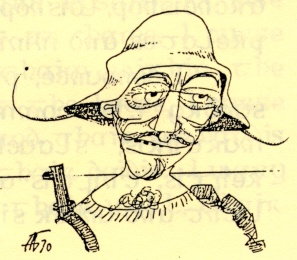
From George
MacDonald Fraser's The Steel Bonnets (Knopf, New York, 1972), the
Archbishop of Glasgow's "Monition of Cursing" against the Border reivers from
c.1524:
Therefore through the authority of Almighty God, the Father of heaven, his
Son, our Saviour, Jesus Christ, and of the Holy Ghost; through the authority of
the Blessed Virgin Saint Mary, Saint Michael, Saint Gabriel, and all the angels;
Saint John the Baptist, and all the holy patriarchs and prophets; Saint Peter,
Saint Paul, Saint Andrew, and all holy apostles; Saint Stephen, Saint Laurence,
and all holy martyrs; Saint Gile, Saint Martin, and all holy confessors; Saint
Anne, Saint Katherine, and all holy virgins and matrons; and of all the saints
and holy company of heaven; by the authority of our Holy Father the Pope and his
cardinals, and of my said Lord Archbishop of Glasgow, by the advice and
assistance of my lords, archbishop, bishops, abbots, priors, and other prelates
and ministers of holy church,
I denounce, proclaim, and declare all and
sundry the committers of the said saikles murthris, slauchteris, brinying,
heirchippes, reiffis, thiftis and spulezeis, oppinly apon day licht and under
silence of nicht, alswele within temporale landis as kirklandis; togither with
thair part takaris, assistaris, supplearis, wittandlie resettaris of thair
personis, the gudes reft and stollen by thaim, art or part thereof, and their
counsalouris and defendouris, of thair evil dedis generalie CURSIT, waryit,
aggregeite, and reaggregeite, with the GREIT CURSING.
I curse thair heid and
all the haris of their heid; I curse thair face, thair ene, thair mouth, thair
neise, thair toung, thair teith, thair crag, thair schulderis, thair breist,
thair hert, thair stomok, thair bak, thair wame, thair armes, thair leggis,
thair handes, thair feit, and everilk part of thair body, frae the top of thair
heid to the soill of thair feit, befoir and behind, within and without.
I curse thaim gangand, and I curse thaim rydand; I curse thaim standand, and I
curse thaim sittand; I curse thaim etand, I curse thaim drinkand; I curse thaim
walkand, I curse thaim sleepand; I curse thaim rysand, I curse thaim lyand; I
curse thaim at hame, I curse thaim fra hame; I curse thaim within the house, I
curse thaim without the house; I curse thair wiffis, thair barnis, and thair
servandis participand with thaim in thair deidis. I wary thair cornys, thair
catales, thair woll, thair scheip, thair horse, thair swyne, thair geise, thair
hennys, and all thair quyk gude. I wary thair hallis, thair chalmeris, thair
kechingis, thair stanillis, thair barnys, thair biris, thair harrowis, and the
gudis and housis that is necessair for thair sustentatioun and weilfair.
* * *
And, finally, I condemn thaim perpetualie to the deip
pit of hell, the remain with Lucifer and all his fallowis, and thair bodeis to
the gallowis of the Burrow Mure, first to be hangit, syne revin and ruggit with
doggis, swyne, and utheris wyld beists, abhominable to all the warld. And their
candillis gangis frae your sicht, as mot their saulis gang fra the visage of
God, and thair gude faim fra the warld, quhill thai forbeir thair oppin synnys
foirsaidis and ryse frae this terribill cursing, and mak satisfaction and
pennance.
About 2 pages were omitted at the asterisks above. The reader can probably
tell where I abandoned the attempt to modernize the spelling.
Typing completed mid-November -
Merry Christmas to All
And a Happy New Year!
Return to INDEX












